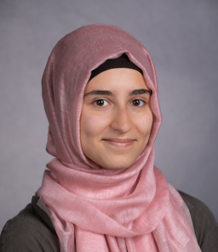Name: Ayse Sahan
Hometown: Sunnyvale, California
Lab: Jin Zhang Lab at UCSD
Lab websites: http://jinzhanglab.ucsd.edu/
Hobbies: Reading, baking, watching reality tv and cooking competitions, taking walks
What do you study? The Zhang lab studies cell signaling using fluorescent protein-based biosensors, which can be attached to proteins to show us what they are doing inside of cells. I use biosensors to study the mTOR protein, which is important in many cancers because it controls cell growth and survival. To do this, a biosensor is attached to a protein that interacts with mTOR. Once mTOR interacts with this protein, the biosensor fluoresces, and we can track its activity and movement in the cell under a microscope. Using this method to study mTOR activity can help us understand how mTOR can control cell growth and survival at different cellular organelles to ultimately lead to cancer.
Why is it important? mTOR is often dysregulated and is linked to acquired drug resistance in many types of cancers. It is important to understand how mTOR could function at different organelles because it can help us understand how mTOR contributes to cancer and acquired drug resistance. It can also help us find more specific targets for cancer therapies with reduced toxicity.
How did you become interested in science? I’ve had an interest in science since childhood and loved entering my middle school’s science fair! But working at a research lab during college is what really helped me appreciate the creativity and diligence that goes into conducting science.
What do you like about being a scientist? I love that there is no end to scientific discovery. I am in the process of learning how to search for answers to the questions that I am currently interested in (usually about cellular signaling that contributes to cancer). As a scientist, I can go as far as my ideas and creativity can take me. I am motivated by the fact that my work can contribute to impacting society and human health in the future by adding to an expanding base of knowledge.
What are 5 general vocabulary terms someone should know going into your field of science?
Cell, signaling, protein, gene, organelle
What are 5 specific vocabulary terms someone should know about your research?
Fluorescent protein, endogenous expression, FRET (Förster Resonance Energy Transfer), compartmentalized signaling, transcription

